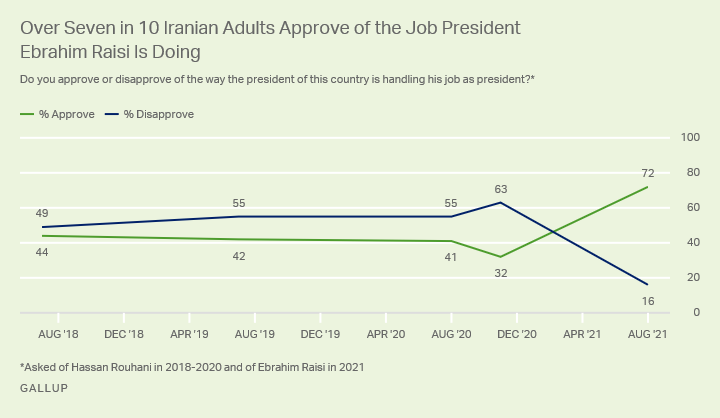Story Highlights
- 72% of Iranians approve of the job President Ebrahim Raisi is doing
- Up from 32% approval for former President Hassan Rouhani in 2020
- 59% of Iranians have confidence in their national government
WASHINGTON, D.C. -- Just a few weeks into Ebrahim Raisi's presidency, Gallup surveys in Iran showed Raisi had the backing of the Iranian people that had mostly eluded his predecessor, Hassan Rouhani. Shortly after Raisi took office in August, 72% of Iranians expressed approval of the job he was doing.

Line graph. The percentages of Iranians who approve of the jobs that Presidents Ebrahim Raisi and Hassan Rouhani have done. In the last reading of Rouhani's presidency, in November of last year, 32% approved of the job he was doing. This contrasts with the first reading of Raisi's presidency, when 72% approved of the job he was doing.
These latest data come from Gallup's survey conducted Aug. 24-31, three weeks after Raisi took office. Raisi has been characterized in the West as a hard-line conservative cleric, contrasting with Rouhani who was perceived as a more moderate figure who would potentially reform the Iranian government. Despite his characterization as a moderate, Rouhani never received majority-level job approval in any of Gallup's readings during his presidency.
In the last survey during Rouhani's presidency, conducted in November 2020 as the pandemic ravaged Iran, roughly a third of Iranians (32%) approved of the job Rouhani was doing. The Iranian government's response to the COVID-19 pandemic under Rouhani was criticized earlier this year for mismanagement and a lack of transparency after Supreme Leader Ali Khamenei banned the import of coronavirus vaccines from U.S. or U.K. sources. In a separate question in this year's August poll, Iranians were asked retrospectively if they approved of the job Rouhani had done as president, and 23% indicated they did.
Iranians' Confidence in Their Government Rises After Raisi's Election
The poorly rated Iranian government response to the COVID-19 pandemic coincided with a drop in Iranians' confidence in their national government, declining from 52% in July 2019 to 47% in August 2020 and falling further to 41% in November. That 41% was the lowest level of confidence recorded in Gallup's trend.
Even before taking office, Raisi articulated a plan to tackle the pandemic, focusing on increasing COVID-19 vaccination throughout the country. Prior to Raisi's election in June, about 5% of the Iranian population was at least partly vaccinated; since then, the percentage of vaccinated Iranians has risen to nearly 50%. The increase in availability of vaccines from non-Western sources and the new administration's emphasis on taking action on the pandemic likely contributed to the spike in Iranians' confidence in their national government, which jumped to 62% shortly after Raisi entered office.

Line graph. Iranians' confidence in their nation government. 59% of Iranians now have confidence in their national government, up from 41% in November of last year.
Bottom Line
Raisi has come into office with an apparent reservoir of goodwill among the Iranian public. However, public opinion could sour rapidly if his government is unable to follow through on its pledge to swiftly address the pandemic situation. In the short term, reports indicate COVID-19 vaccination has accelerated substantially in the country. However, daunting challenges remain -- particularly concerning the country's economy -- and only time will tell if Raisi delivers on his promises to the Iranian people.
For observers outside of Iran, Raisi's job approval rating and the spike in Iranians' confidence in their government that coincided with his election should indicate that a leader perceived as hard-line and conservative can still garner substantial public support in Iran. If Raisi succeeds in turning around the country's pandemic response and improving the lives of Iranians, the country may be more resistant to external pressures.
Jihad Fakhreddine contributed to this article.
To stay up to date with the latest Gallup News insights and updates, follow us on Twitter.
For complete methodology and specific survey dates, please review Gallup's Country Data Set details.
Learn more about how the Gallup World Poll works.




